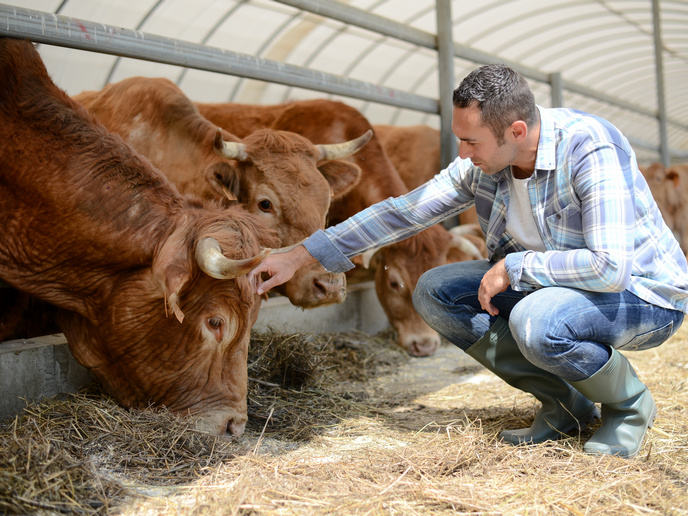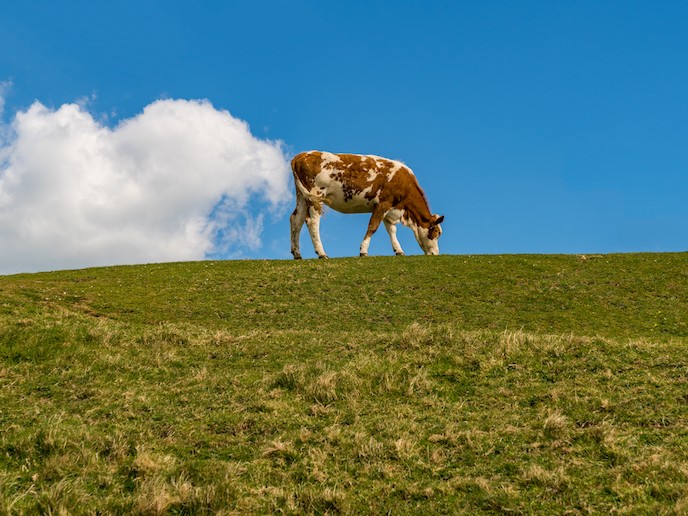Genomic approaches to better cattle breeding
Genomic information – the cellular data that an organism needs to grow and function – has been analysed and used to breed more resilient and healthy cattle for a while. A key drawback is that the biological mechanisms behind certain genetic variants are still not widely understood. The consequences for cattle health and welfare can therefore be unpredictable, because certain genetic traits can have unforeseen side effects. The BovReg(opens in new window) project sought to move towards a more biology-driven approach, where the function of a specific genetic variant is better understood. “This is still a huge unknown area,” says BovReg project coordinator Christa Kuehn, now at the Friedrich-Loeffler Institute(opens in new window) in Germany. “However, we know that the more than 95 % of the genome that is not translated into proteins must have some function, or otherwise evolution would not have carried it over millions of years.”
Investigating regulatory regions of the genome
Kuehn and her colleagues wanted to investigate these regulatory regions of the genome. To uncover these mechanisms, the project, coordinated by the Research Institute for Farm Animal Biology(opens in new window) in Germany, generated huge amounts of shared functional genome data from bovine tissue and frequently used cell lines. The goal was to establish far more detailed knowledge of traits related to robustness and health in cattle. To this end, the project also developed bioinformatic pipelines to ensure that data analysis was both reproducible and interoperable across different platforms. “A huge amount of data also usable for biomedical research was generated,” explains Kuehn. “We wanted to make sure that this information was usable and accessible.” All data will be fed into a global public data portal(opens in new window). “We also carried out ethical mapping(opens in new window) to chart societal perceptions of genomic breeding,” adds Kuehn. “Research can sometimes cause social disruption or reluctance, so we wanted to be ahead of the curve and see what potential implications there might be for society.”
Functional annotation of animal genomes
The results of the BovReg project have also fed into the global FAANG(opens in new window) (Functional Annotation of Animal Genomes) project, an organisation that pulls together genomic research in farmed animals worldwide. The FAANG community is operating in parallel with the ENCODE(opens in new window) initiative. This is dedicated to characterising the function of the human genome. BovReg co-created EuroFAANG, an umbrella initiative of six related EU-funded projects, which have agreed on common data pipelines and general protocols, ensuring that knowledge is disseminated as widely as possible. Building upon this EuroFAANG umbrella, further EU funding was secured 2 years ago for a project called EuroFAANG Research Infrastructure, which will establish the necessary infrastructure to continue this cooperation into the future. “One of the main challenges after a project such as BovReg is keeping people together, and ensuring that the community continues,” says Kuehn.
Improving cattle breeding practices
Kuehn and her team believe that the work pioneered through the BovReg project will help to improve breeding practices. “The more we know about genomic function, the more we can avoid detrimental side effects of breeding,” she notes. “This could save resources and improve animal welfare.” Better genomic information could also lead to more targeted animal management and veterinary intervention. “Some animal populations might benefit from personalised treatment more than others,” adds Kuehn. “Getting closer to understanding genomic functions can help us to understand the real needs of animals.”







